形容词adj 方式副词adv.
《形容词和副词》专题复习

《形容词和副词》专题复习考纲概览一、形容词adj.和副词adv.区分运用1.形容词adj.(1)adj. + 名;如:Father gave me a beautiful bike. 爸爸给我一辆漂亮的自行车。
(2)系+ adj. ;如:Our classroom is big and clean. 我们的教室又大又干净。
(3)实动+ sb./sth. + adj.如:I find it interesting to learn English.我发现学习英语有趣。
2.副词adv.(1)动+ adv. 如:John spoke loudly to the old man.约翰大声地跟那位老人说话。
(2)adv. + adj./adv. 如:The tree is very tall.这棵树非常高。
(3)adv.+句子如:Luckily, nobody was hurt.幸运的是,没有人受伤。
二、形容词adj.和副词adv.的三级变化及运用大多数形容词和副词有三个等级:原级比较级最高级自主学习:请写出下列形容词或副词的比较级和最高级。
great________ ________ fast_______ _______ fine ______ _______late________ _________thin ________ ________ big_______ _______ happy________ ______ early_______ ________delicious _____________ ______________importantly________________ _________________much \many_________ ________little__________ _________good\well___________ __________学生总结形容词和副词的比较级和最高级的构成规则。
英语八年级上册Unit3形容词与副词比较级
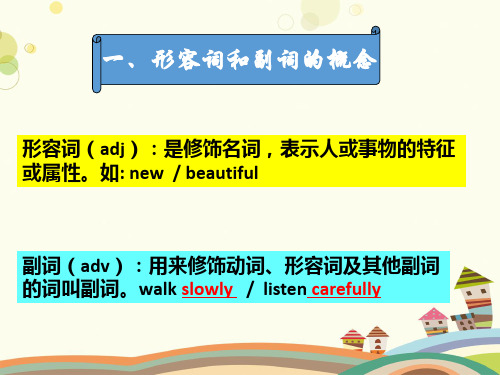
疑问副词 how, when, where, why
连接副词 however, how, when, where, why
more exciting most exciting
一、形容词原级的比较。 as +原级+as表“和……一样”的意思; not as/ so ……as
表“不如”或“不一样”。
1.The book is ___a_s_n_e_w__a_s that one.(一样新) 2.My bike is ___n_o_t_a_s__/_s_o_g_o_o_d__a_s_ yours.(不如…好)
以辅音字母结尾 双写辅音字母, thin-thinner-thinnest 的重读闭音节词 再加-er ,-est big-bigger-biggest
多音节和部分双 在词前加 more ,slowly,more slowly del
音节单词
most
more delicious most d
注意:以ing ,ed和 ly结尾的词在其前加more (the) most
加 –r ,-st
tall-taller-tallest small-smaller-smallest
nice-nicer-nicest large-larger-largest
以“辅音+y”结 尾的词
变y为i再加-er -est
,
dry-drier-driest happy-happier-happiest heavy-heavier-heaviest
adj adv原级的用法

adj adv原级的用法形容词(adj)和副词(adv)的原级是它们最基本的形态,用于比较两个或多个事物之间的差异。
以下是关于形容词和副词原级用法的详细解释:1、形容词原级:形容词原级是形容词的基本形式,用于描述名词或代词的属性或特征。
例如:The book is interesting.(这本书很有趣。
)She is beautiful.(她很漂亮。
)在比较两个或多个事物时,可以使用形容词原级进行比较。
例如:This apple is redder than that one.(这个苹果比那个更红。
)These flowers are more beautiful than those.(这些花比那些更漂亮。
)2、副词原级:副词原级是副词的基本形式,用于描述动词、形容词或其他副词的程度或方式。
例如:He runs fast.(他跑得快。
)She sings beautifully.(她唱得很美。
)在比较两个或多个动作或状态时,可以使用副词原级进行比较。
例如:He runs faster than she.(他跑得比她快。
)She sings more beautifully than him.(她唱得比他更美。
)需要注意的是,有些形容词或副词的原级形式可能与其他形式相似,容易混淆。
例如,“good”的副词是“well”,而不是“better”。
因此,在使用形容词或副词的原级时,需要特别注意它们的正确形式。
总之,形容词和副词的原级是它们的基本形式,用于描述事物或动作的状态或程度。
在使用时,需要根据具体情况选择合适的形容词或副词,并注意它们的正确形式。
形容词和副词
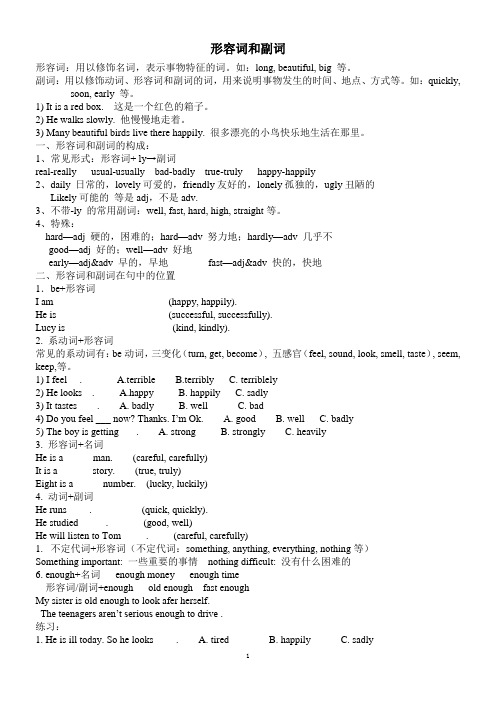
形容词和副词形容词:用以修饰名词,表示事物特征的词。
如:long, beautiful, big 等。
副词:用以修饰动词、形容词和副词的词,用来说明事物发生的时间、地点、方式等。
如:quickly, soon, early 等。
1) It is a red box. 这是一个红色的箱子。
2) He walks slowly. 他慢慢地走着。
3) Many beautiful birds live there happily. 很多漂亮的小鸟快乐地生活在那里。
一、形容词和副词的构成:1、常见形式:形容词+ ly→副词real-really usual-usually bad-badly true-truly happy-happily2、daily 日常的,lovely可爱的,friendly友好的,lonely孤独的,ugly丑陋的Likely可能的等是adj,不是adv.3、不带-ly 的常用副词:well, fast, hard, high, straight等。
4、特殊:hard—adj 硬的,困难的;hard—adv 努力地;hardly—adv 几乎不good—adj 好的;well—adv 好地early—adj&adv 早的,早地fast—adj&adv 快的,快地二、形容词和副词在句中的位置1.be+形容词I am________ (happy, happily).He is ________ (successful, successfully).Lucy is __________ (kind, kindly).2. 系动词+形容词常见的系动词有:be动词,三变化(turn, get, become), 五感官(feel, sound, look, smell, taste), seem, keep,等。
1) I feel __. A.terrible B.terribly C. terriblely2) He looks__. A.happy B. happily C. sadly3) It tastes ___ . A. badly B. well C. bad4) Do you feel ___ now? Thanks. I’m Ok. A. good B. well C. badly5) The boy is getting ___. A. strong B. strongly C. heavily3. 形容词+名词He is a _____ man. (careful, carefully)It is a ______ story. (true, truly)Eight is a _____ number. (lucky, luckily)4. 动词+副词He runs ____. (quick, quickly).He studied _____. (good, well)He will listen to Tom_____. (careful, carefully)1.不定代词+形容词(不定代词:something, anything, everything, nothing等)Something important: 一些重要的事情nothing difficult: 没有什么困难的6. enough+名词enough money enough time形容词/副词+enough old enough fast enoughMy sister is old enough to look afer herself.The teenagers aren’t serious enough to drive .练习:1. He is ill today. So he looks ____. A. tired B. happily C. sadly2. My brother doesn’t feel ___ today. A. good B. well C. happily3. The food smells ___ . I don’t like it A. good B. badly C. bad4. He writes very ____. A. careful B. carefully C. bad5. I study very____. A. hard B. hardly C. careful6. The weather gets ___. A. warm B. warmly C. coldly7. Our country is becoming ___. A. strong B. strongly C. richly8. Is there ____ in the newspaper ?A. something newB. new anythingC. anything new9. There is ___ with my bike. It works well.A. nothing wrongB. wrong somethingC. something wrong10. He speaks ____ for me to understand.A. too slowlyB. slowly enoughC. enough slowly11. He runs ___ to catch up with me.A. too fastB. quick enoughC. quickly enough12. I’m ____ I can’t say a wordA. too happy toB. happy enough thatC. so happy that13.你能给我一些吃的吗? Can you ______________________________?14.老师告诉我们一些有趣的事情. The teacher ______________________.15.他够高可以摘到那个苹果. He is _____________________ the apple.16.他工作够仔细. He works______________.17.他上课不够认真He ____________________.18.这音乐听起来很美妙. ____________________________.19. Tom 看起来不开心. ___________________________.20. 这石头太重, 我帮不动. The stone _____________________ carry.三、形容词&副词的比较级和最高级1. 原级、比较级、最高级的构成规则:1) 直接+er, +est : cold –colder –coldest high—higher—highest2) 以 e结尾的+r, +st: fine –finer—finest nice --nicer --nicest3) 以y结尾的, 改y为i, 再+er. +estEasy--easier --easiest Happy--happier -- happiest1)重读闭音节单词,双写辅音,再+er, +estbig – bigger – biggest sad--sadder—saddest thin – thinner – thinnest6) 多音节词,+more, +mostBeautiful—more beautiful—most beautifulImportant—more important—most importantDelicious—more delicious—most delicious2)不规则变化good / well – better – best ill / bad / badly – worse – worstmany / much – more – most little – less – leastfar – farther / further– farthest / furthest练习:写出下列单词的比较级和最高级small _______ _______ nice ________ _______ big ________ _________ early ______ ________ heavy _______ ______ wet _______ ________late _______ _______cold _______ _______ popular _______ _______ interesting _______ _______old _______ ______ much _______ ______red _______ ______ good _______ ______2. 形容词、副词比较等级的用法与句型:1) 原级:表示两者一样或不一样结构:as + 原级+as not as/so + 原级+asMy friend Kay is as tall as me.My friend Ka y isn’t as/ so tall as me.Exercises:①Joan与Kate一样小心. Joan is _________________ Kate.②我与你学习一样努力。
形容词与副词
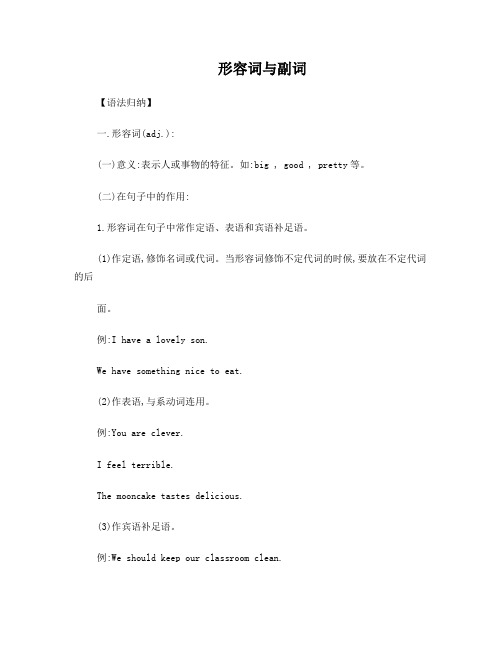
形容词与副词【语法归纳】一.形容词(adj.):(一)意义:表示人或事物的特征。
如:big , good , pretty等。
(二)在句子中的作用:1.形容词在句子中常作定语、表语和宾语补足语。
(1)作定语,修饰名词或代词。
当形容词修饰不定代词的时候,要放在不定代词的后面。
例:I have a lovely son.We have something nice to eat.(2)作表语,与系动词连用。
例:You are clever.I feel terrible.The mooncake tastes delicious.(3)作宾语补足语。
例:We should keep our classroom clean.2.特殊的形容词:(1)ill和well表示身体健康的时候,只能作表语,不作定语。
例:The boy was ill .不能说:He was an ill boy.The girl looks very well.不能说:She is a well girl.(2)以ly结尾的形容词,不要认为是副词。
如:friendly, lonely , lively二.副词(adv.)(一)意义:(修饰动词、形容词或其他副词)表示时间、地点、方法或程度等。
如:very , quite , slowly等。
(二)种类:1. 时间副词:now, then, ago , tomorrow2. 地点副词:here, there, outside, everywhere3. 方式副词:slowly, happily, angrily4.程度副词:almost, hardly, nearly5.疑问副词:how, why, where, when6.频度副词:always, often , usually(三)副词在句子中的位置:一般情况下,时间副词和地点副词的位置通常在句末,二者同时出现时,先地点后时间。
形容词(adj)与副词(adv)

形容词(adj)与副词(adv)概念:形容词:形容词是⽤以修饰名词或某些代词,表⽰⼈或事物的性质,特征或状态的。
如: She is very sad. 她很伤⼼。
副词:在句⼦中表⽰⾏为或状态特征的词,⽤来修饰实义动词、形容词、其他副词的⼀种词类。
多数副词放在动词后⾯,或者放在be动词、助动词或情态动词之后,实义动词之前。
如果实义动词后有宾语,则放于宾语之后。
如:Have you seen him lately? 你最近见到过他吗?⽐较级:1) ⼀般单⾳节词末尾加er 和 eststrong -- stronger – strongest2) 单⾳节词如果以e结尾,只加r 和ststrange – stranger – strangest3) 闭⾳节单⾳节词如末尾只有⼀个辅⾳字母,须先双写这个辅⾳字母,再加er和est。
sad – sadder – saddestbig – bigger – biggesthot – hotter – hottest4) 少数以y, er, ow, ble结尾的双⾳节词,末尾加er和est (以y结尾的词,如y前是辅⾳字母,把y变成i,再加er和est,以e结尾的词仍只加r和st)angry -- angrier -- angriestclever -- cleverer -- cleverestnarrow -- narrower -- narrowestnoble -- nobler -- noblest5) 其他双⾳节和多⾳节词都在前⾯加单词more和mostdifferent -- more different -- most different2. 不规则的⽐较级和最⾼级good -- better -- bestwell -- better -- bestbad -- worse -- worstold -- older/elder -- oldest/eldestmuch/many -- more -- mostlittle -- less -- leastfar -- farther/further -- farthest/furthest3. 形容词⽐较级的⽤法1) 形容词⽐较级单独使⽤* Which book is more suitable? 哪⼀本书更适合呢?* It couldn't be easier to finish the task. 要完成这任务不能再容易了。
英语十类词性分类及用法-最全讲解
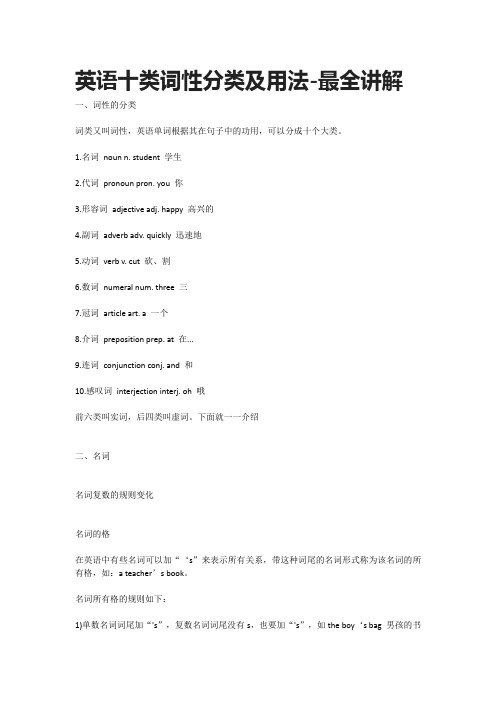
英语十类词性分类及用法-最全讲解一、词性的分类词类又叫词性,英语单词根据其在句子中的功用,可以分成十个大类。
1.名词noun n. student 学生2.代词pronoun pron. you 你3.形容词adjective adj. happy 高兴的4.副词adverb adv. quickly 迅速地5.动词verb v. cut 砍、割6.数词numeral num. three 三7.冠词article art. a 一个8.介词preposition prep. at 在...9.连词conjunction conj. and 和10.感叹词interjection interj. oh 哦前六类叫实词,后四类叫虚词。
下面就一一介绍二、名词名词复数的规则变化名词的格在英语中有些名词可以加“‘s”来表示所有关系,带这种词尾的名词形式称为该名词的所有格,如:a teacher’s book。
名词所有格的规则如下:1)单数名词词尾加“'s”,复数名词词尾没有s,也要加“'s”,如the boy‘s bag 男孩的书包,men’s room 男厕所。
2)若名词已有复数词尾-s ,只加“'”,如:the workers’struggle工人的斗争。
三、代词大多数代词具有名词和形容词的功能。
英语中的代词,按其意义、特征及在句中的作用分为:人称代词、物主代词、指示代词、反身代词、相互代词、疑问代词、关系代词、连接代词和不定代词九种人称代词的用法I saw her with them,at least, I thought it was her.我看到她和他们在一起,至少我认为是她。
(her做宾语,them做介词宾语,her作主补)a. -- Who broke the vase?--谁打碎了花瓶?b. -- Me.--我。
并列人称代词的排列顺序1) 单数人称代词并列作主语时,其顺序为:如:You, he and I should return on time.2) 复数人称代词作主语时,其顺序为:反身代词指示代词指示代词分单数(this / that)和复数(these / those)两种形式,既可作限定词又可做代词疑问代词指人:who,whom,whose指物:what既可指人又可指物:which四、冠词冠词是位于名词或名词词组之前或之后,在句子里主要是对名词起限定作用的词。
英语中形容词(adj)变副词(adv)的规则示例
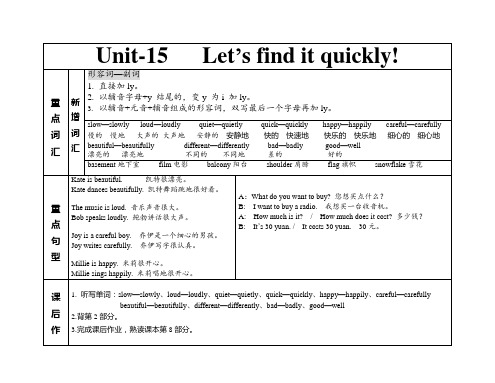
Unit-15 Let’s find it quickly!重点词汇新增词汇形容词—副词1.直接加ly。
2.以辅音字母+y 结尾的,变y 为i 加ly。
3.以辅音+元音+辅音组成的形容词,双写最后一个字母再加ly。
slow—slowly loud—loudly quiet—quietly quick—quickly happy—happily careful—carefully 慢的慢地大声的大声地安静的安静地快的快速地快乐的快乐地细心的细心地beautiful—beautifully different—differently bad—badly good—well漂亮的漂亮地不同的不同地差的好的basement地下室film电影balcony阳台shoulder肩膀flag旗帜snowflake雪花重点句型Kate is beautiful. 凯特很漂亮。
Kate dances beautifully. 凯特舞蹈跳地很好看。
The music is loud. 音乐声音很大。
Bob speaks loudly. 鲍勃讲话很大声。
Joy is a careful boy. 乔伊是一个细心的男孩。
Joy writes carefully. 乔伊写字很认真。
Millie is happy. 米莉很开心。
Millie sings happily. 米莉唱地很开心。
A:What do you want to buy? 您想买点什么?B: I want to buy a radio. 我想买一台收音机。
A: How much is it? / How much does it cost? 多少钱?B: It’s 30 yuan. / It costs 30 yuan. 30元。
课后作1. 听写单词:slow—slowly、loud—loudly、quiet—quietly、quick—quickly、happy—happily、careful—carefullybeautiful—beautifully、different—differently、bad—badly、good—well2.背第2部分。
- 1、下载文档前请自行甄别文档内容的完整性,平台不提供额外的编辑、内容补充、找答案等附加服务。
- 2、"仅部分预览"的文档,不可在线预览部分如存在完整性等问题,可反馈申请退款(可完整预览的文档不适用该条件!)。
- 3、如文档侵犯您的权益,请联系客服反馈,我们会尽快为您处理(人工客服工作时间:9:00-18:30)。
Lesson 1 A private conversation
1
Part One Suffix –ly (后缀-ly)
Part Two 形容词和副词的【句法功能】Different Roles in A Sentence 1. a. He is a careful worker. b. He is very careful. c. He works carefully. 2. a. They are loud when they talk. b. They are very loud children. c. They talk loudly. 3. a. She is angry when she speaks to me. b. She is an angry woman. c. She speaks angrily to me. 4. a. The boy is rude to his teacher. b. He is a rude boy. c. The boy behaves rudely to his teacher. 5. a. He is quick when he runs. b. He is a quick runner. c. He runs quickly. 6. a. It is a slow train. b. The train is very slow. c. The train goes slowly. Part Three: Exercise: 1.Look at the children on the playground. They are flying the kites ________ (愉快). Let ’s join them. 2.Why do you think you did so ______ (糟糕) in your test? 3.Congratulations! You ’ve answered all the question __________ (correct). 4.“Why didn ’t you tell me earlier?” the boss shouted __________ (生气). 5.Miss Xu smiled and said to me _______ (soft), “Never mind, my boy.” st night it rained ________ (大) in the southern part of China. 7.We should speak to the old _________ (polite). 8.Mike walked _________ (quiet) into the room not to wake up his grandpa. 9.The fireman have saved the boy from the fire ____________ (successful). 10.Simon hates to be others. He always tries to do everything ____________ (不同).
11. - How was the weather yesterday? - It was terrible. It rained _________ all day.
A. strongly
B. heavily
C. badly
D. hardly
12. People in different countries behave _______ when they eat dinner.
A. politely
B. healthily
C. differently
D. quietly
13. - Is the English problem______? - Yes. I can work it out _______.
A. easy; easily
B. easy; easy
C. easily; easy
D. easy; easier
14. I got up ____ today. A. late B. later C. lately D. more lately
15. Her mother was out. She stayed at home______, but she didn ’t feel____.
A. alone; lonely
B. lonely; lonely
C. alone; alone
D. lonely; alone。
